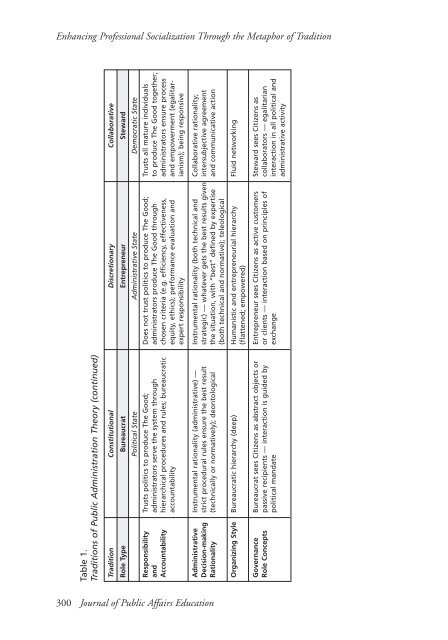JOURNAL OF PUBLIC AFFAIRS EDUCATION - naspaa
JOURNAL OF PUBLIC AFFAIRS EDUCATION - naspaa
JOURNAL OF PUBLIC AFFAIRS EDUCATION - naspaa
You also want an ePaper? Increase the reach of your titles
YUMPU automatically turns print PDFs into web optimized ePapers that Google loves.
Enhancing Professional Socialization Through the Metaphor of Tradition<br />
Table 1.<br />
Traditions of Public Administration Theory (continued)<br />
Tradition<br />
Role Type<br />
Responsibility<br />
and<br />
Accountability<br />
Constitutional Discretionary Collaborative<br />
Bureaucrat Entrepreneur Steward<br />
Political State Administrative State Democratic State<br />
Trusts politics to produce The Good;<br />
administrators serve the system through<br />
hierarchical procedures and rules; bureaucratic<br />
accountability<br />
Does not trust politics to produce The Good;<br />
administrators produce The Good through<br />
chosen criteria (e.g. efficiency, effectiveness,<br />
equity, ethics); performance evaluation and<br />
expert responsibility<br />
Trusts all mature individuals<br />
to produce The Good together;<br />
administrators ensure process<br />
and empowerment (egalitarianism);<br />
being responsive<br />
Administrative<br />
Decision-making<br />
Rationality<br />
Instrumental rationality (administrative) —<br />
strict procedural rules ensure the best result<br />
(technically or normatively); deontological<br />
Instrumental rationality (both technical and<br />
strategic) — whatever gets the best results given<br />
the situation, with “best” defined by expertise<br />
(both technical and normative); teleological<br />
Organizing Style Bureaucratic hierarchy (deep) Humanistic and entrepreneurial hierarchy<br />
(flattened; empowered)<br />
Collaborative rationality;<br />
intersubjective agreement<br />
and communicative action<br />
Fluid networking<br />
Governance<br />
Role Concepts<br />
Bureaucrat sees Citizens as abstract objects or<br />
passive recipients — interaction is guided by<br />
political mandate<br />
Entrepreneur sees Citizens as active customers<br />
or clients — interaction based on principles of<br />
exchange<br />
Steward sees Citizens as<br />
collaborators — egalitarian<br />
interaction in all political and<br />
administrative activity<br />
300 Journal of Public Affairs Education
















